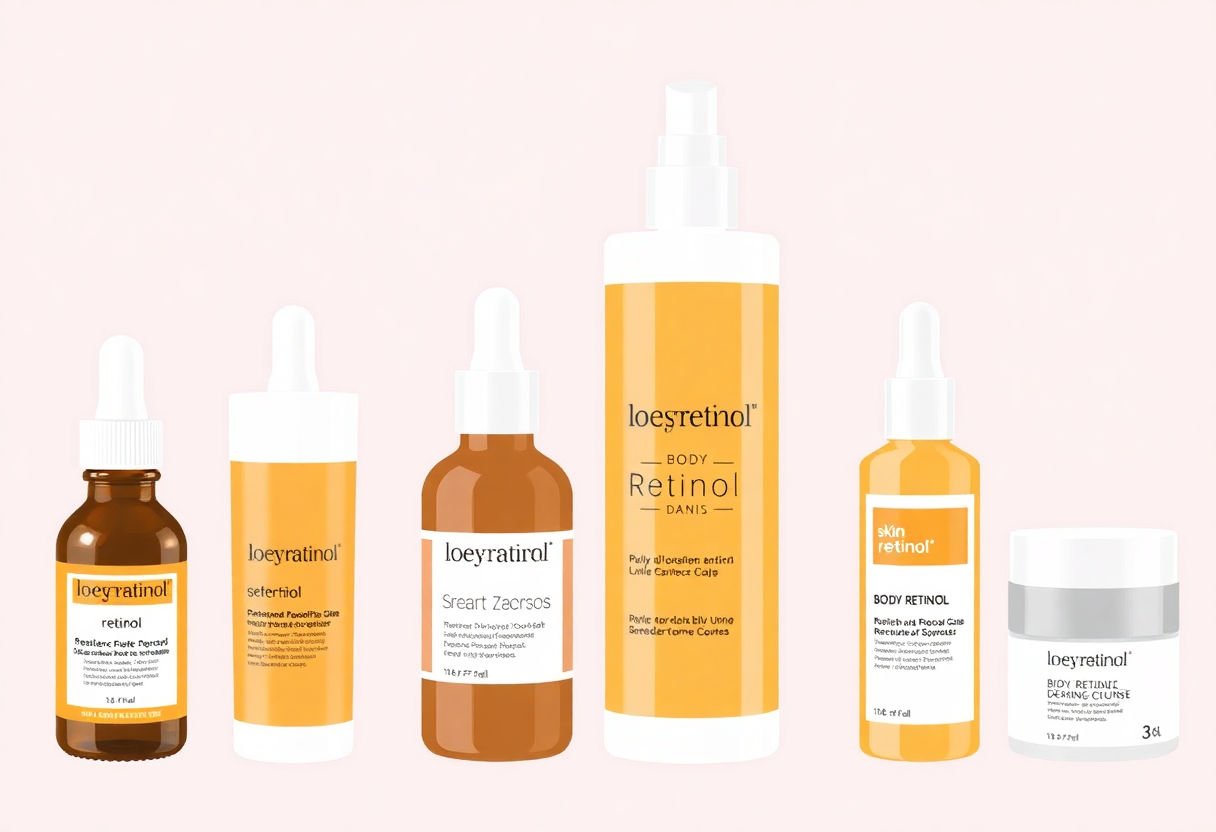Retinol has earned its place as a highly esteemed ingredient in skincare, lauded for its transformative effects across various skin types. As an effective powerhouse, retinol enhances skin texture, diminishes fine lines, and revitalizes both dry and oily skin. By selecting the right retinol formulations tailored to specific needs, individuals can maximize its benefits. From anti-aging properties to skin renewal, this article provides comprehensive insights into how retinol can become an integral part of your skincare regimen. Discover personalized recommendations that cater to dry, oily, and sensitive skin, ensuring you harness the full potential of this distinguished skincare ally.
Key Takeaways
- Retinol is a versatile skincare ingredient that provides significant anti-aging and skin renewal benefits when used on the body.
- Different skin types require specific formulations, ensuring that products are tailored to individual needs for optimal results.
- Incorporating retinol into your body care routine can enhance skin texture and tone, but must be done gradually to avoid irritation.
- Common mistakes in using retinol can be prevented by following recommended guidelines, enhancing the effectiveness of your skincare regimen.
- Selecting the right retinol product involves understanding your skin type and choosing the appropriate concentration to maximize benefits.
Understanding Retinol

Retinol, a derivative of Vitamin A, is a powerful ingredient renowned for its transformative effects on the skin. It works by accelerating cell turnover, which is the process by which old, dead skin cells are replaced with new, healthy ones. This action not only helps to smooth out fine lines and wrinkles but also improves overall skin texture, making it a staple in many anti-aging skincare routines.
One of the most significant aspects of retinol is its ability to stimulate collagen production. Collagen is a fundamental protein that provides the skin with its structure and elasticity. As we age, collagen production naturally decreases, leading to sagging skin and the development of wrinkles. By promoting collagen synthesis, retinol helps maintain youthful, firm skin.
Retinol also plays a crucial role in diminishing hyperpigmentation and evening out skin tone. It can effectively reduce the appearance of dark spots and sun damage, offering a more radiant complexion. For those struggling with acne, retinol is an ally. Its exfoliating properties help to unclog pores and prevent the formation of blemishes while also reducing post-acne marks.
When incorporating retinol into your skincare routine, it is essential to understand its potential for causing irritation, especially for first-time users or those with sensitive skin. It is advisable to start with a lower concentration, gradually increasing use as tolerated. Always apply retinol products in the evening and pair them with a broad-spectrum sunscreen during the day to protect against UV damage, as retinol can increase the skin’s sensitivity to sunlight.
Benefits of Retinol for Skin

Retinol, a derivative of vitamin A, is celebrated for its multifaceted benefits to the skin. It is particularly renowned for its anti-aging properties. Retinol accelerates skin renewal, promoting the shedding of old cells and the growth of new, healthy cells. This process results in a smoother texture and can significantly diminish the appearance of fine lines and wrinkles.
Apart from its age-defying capabilities, retinol is also effective in addressing hyperpigmentation. By promoting cellular turnover, it helps to even out skin tone, reducing dark spots and discoloration. This makes retinol an ideal choice for those seeking a more radiant complexion.
Moreover, retinol has a profound impact on acne-prone skin. Its exfoliating properties help to unclog pores, reducing the frequency and severity of breakouts. Over time, retinol can also help fade residual acne scars, improving overall skin clarity.
For those combating rough or sun-damaged skin, retinol serves as a rejuvenating agent. By boosting collagen production, it enhances skin elasticity and resilience, making the skin appear more youthful and vibrant.
It’s crucial, however, to introduce retinol gradually into your skincare routine to minimize potential irritation, especially if you have sensitive skin. Starting with a lower concentration and slowly increasing usage frequency can help mitigate adverse reactions. Incorporating a robust sunscreen into your daily regimen is also essential, as retinol can increase skin sensitivity to UV rays.
Embracing retinol’s transformative potential can lead to noticeably healthier and more youthful skin, making it a staple in modern skincare.
Choosing the Right Retinol for Your Skin Type

When selecting the ideal retinol product for your skin type, it is essential to consider your skin’s unique characteristics and needs. This section provides guidelines to ensure you make an informed decision.
Normal Skin
For those with normal skin, retinol products are usually well-tolerated. Look for formulations that balance potency and hydration, allowing your skin to benefit from retinol’s regenerative properties without excessive dryness.
Dry Skin
If you have dry skin, choose retinol products that incorporate moisturizing ingredients such as hyaluronic acid or glycerin. These ingredients help maintain skin hydration and reduce the likelihood of flaking or peeling. A cream-based retinol can be especially beneficial to enhance moisture retention.
Oily Skin
Individuals with oily skin may benefit from gel-based retinol products that are less likely to contribute to excessive shine. Pay attention to non-comedogenic labels to ensure that the product won’t clog your pores, which can lead to breakouts. Products with a lower concentration of retinol may also help in managing oiliness.
Sensitive Skin
For sensitive skin, selecting a gentle formulation is crucial to prevent irritation. Opt for retinol products specifically labeled as safe for sensitive skin, typically with a lower concentration of the active ingredient. Products containing soothing agents such as aloe vera or chamomile can provide additional comfort and reduce potential redness.
Combination Skin
For combination skin, a balanced approach is key. Consider layering different products for distinct areas. For example, use a more moisturizing retinol cream on dry areas and a lighter gel formulation on oily regions. This targeted approach ensures each part of your skin receives appropriate care.
By tailoring your retinol product choice to your skin type, you can maximize the benefits while minimizing potential side effects, leading to healthier and more radiant skin.
Retinol Products for Dry Skin
When selecting retinol products for dry skin, it is important to prioritize formulas that incorporate hydrating and nourishing ingredients. Retinol can be profoundly effective, increasing skin cell turnover and promoting youthful vigor, yet it can occasionally leave dry skin even more parched if not balanced with appropriate moisturizing agents.
When looking for the best retinol products for dry skin, consider opting for:
-
Retinol paired with Hyaluronic Acid: These products offer the dual benefit of stimulating collagen production while also drawing moisture to the skin, ensuring hydration.
-
Cream-based Retinol: Cream formulations often contain additional emollients, which aid in sealing moisture into the skin, counteracting potential dryness.
-
Inclusion of Ceramides: Ceramides help restore the skin barrier, reducing irritation and enhancing the overall comfort for dry skin types when using retinol.
One particularly effective strategy is to choose products that feature gradual-release retinol technology. This method delivers retinol to the skin slowly and steadily, allowing it to work through the night without overwhelming the skin’s natural defenses.
Experts recommend applying retinol products as part of your nighttime routine. Following application, use a rich moisturizer to lock in hydration. As dermatologist Dr. Jane Smith notes, “Integrating moisturizing agents with retinol is crucial for individuals with dry skin, maintaining both effectiveness and skin health.”
By carefully selecting products and incorporating thoughtful application techniques, individuals with dry skin can enjoy the transformative benefits of retinol without exacerbating dryness.
Retinol Products for Oily Skin

Retinol, often celebrated for its transformative properties, is an exciting option for those with oily skin. Choosing the right formulation is crucial to harness its benefits without exacerbating oiliness. Retinol products designed for oily skin often include ingredients that help balance oil production while providing the anti-aging benefits retinol is known for.
When selecting retinol for oily skin, consider products that are lightweight and non-comedogenic. Gels, serums, and lotions with retinol can efficiently penetrate the skin without leaving a greasy residue, making them ideal for oily skin types.
Noteworthy product features to look for include:
- Oil-free formulations: These are designed to absorb quickly and leave the skin feeling smooth and matte.
- Exfoliating ingredients: These assist in clearing pores and preventing breakouts often associated with oily skin.
- Hydrating components: While it may seem counterintuitive, ingredients like hyaluronic acid can provide necessary hydration without clogging pores.
Experts recommend integrating retinol gradually to avoid irritation. Start by applying it two to three nights per week, then slowly build to nightly use, monitoring your skin’s reaction. This method helps your skin adjust to retinol’s potent effects, minimizing potential irritation.
Finally, always adhere to a diligent sunscreen routine. Retinol can increase sensitivity to sunlight, making SPF a non-negotiable part of your morning regimen. This careful incorporation ensures that retinol products work effectively, reducing oiliness and enhancing overall skin texture.
Retinol Products for Sensitive Skin

For individuals with sensitive skin, the introduction of retinol into their skincare regimen requires careful consideration to avoid irritation. When selecting retinol products for this skin type, it’s crucial to focus on gentle formulations crafted to minimize potential side effects. Sensitive skin can react to high concentrations of retinol, making it essential to start with lower doses and gradually increase usage as the skin builds tolerance.
Microencapsulated retinols are an excellent option for sensitive skin as they offer a delayed release, reducing the risk of irritation while maintaining effectiveness. Moreover, these formulations frequently include soothing ingredients such as aloe vera or chamomile to further calm the skin.
When considering the incorporation of retinol into a sensitive skin regimen, look for products that are specifically labeled as hypoallergenic and fragrance-free to prevent unnecessary skin sensitivities. Furthermore, it’s advisable to apply a moisturizer immediately after retinol application to bolster the skin’s barrier and lock in moisture, mitigating the drying effect that retinol can sometimes have.
Starting with applications every two to three nights and observing the skin’s response can provide valuable insights into how much retinol the skin can tolerate. Remember, patience is key; the skin’s renewal may take longer, but with consistent and careful use, visible results are achievable without compromising comfort.
Finally, ensuring robust sun protection with SPF 30 or higher during the day is imperative since retinol can heighten skin sensitivity to the sun. This comprehensive approach will allow those with sensitive skin to effectively and safely harness the benefits of retinol.
How to Incorporate Retinol into Your Skincare Routine
To effectively incorporate retinol into your skincare routine, follow these steps for optimal results. Start by introducing retinol gradually—using it just once or twice a week initially. This allows your skin to build tolerance and minimizes irritation.
When applying retinol, it is crucial to ensure your skin is clean and dry. Moisture can enhance the penetration of retinol, potentially causing irritation, so consider applying it as part of your nighttime routine when your skin is completely dry. Always begin with a pea-sized amount and apply it evenly across the face, avoiding sensitive areas like the eyes and lips.
Layering products wisely is vital when using retinol. After retinol application, wait for approximately 20 to 30 minutes before using any other product to ensure the retinol is fully absorbed. Follow up with a gentle moisturizer to maintain skin hydration and reduce potential dryness or flakiness.
Don’t underestimate the importance of using sunscreen—apply a broad-spectrum SPF the following morning. Retinol can increase skin sensitivity to the sun, making protection against UV rays crucial.
To enhance the benefits of retinol, consider complementing it with hydrating serums or soothing ingredients like hyaluronic acid and niacinamide, which can help counteract dryness and calm the skin.
Lastly, adjust your routine based on your skin’s response. If your skin feels excessively irritated, reduce the frequency of retinol use or choose a milder formulation. Listening to your skin’s needs ensures you achieve the desired anti-aging and rejuvenating effects of retinol while maintaining skin health.
Common Mistakes with Retinol Usage and How to Avoid Them
Using retinol effectively can lead to remarkable skin improvements, but overlooking certain details can counteract these benefits. Here are some common mistakes to watch out for and strategies to avoid them:
-
Over-application: Applying too much retinol can lead to irritation and peeling. To avoid this, start with a pea-sized amount and gradually increase frequency from once or twice a week to nightly as your skin builds tolerance.
-
Neglecting SPF: Retinol increases skin sensitivity to sunlight, heightening the risk of sun damage. Always complement retinol with a broad-spectrum sunscreen of SPF 30 or higher during the day, regardless of the season.
-
Inconsistent Use: For retinol to be effective, consistency is key. Set scheduled applications as per your skincare routine to ensure regular use and better results.
-
Ignoring Product Expiry: Retinol potency decreases over time. Check expiration dates and avoid using old products, ensuring that you’re reaping the full benefits of active ingredients.
-
Mixing with Incompatible Ingredients: Certain ingredients like benzoyl peroxide and AHA/BHA acids can exacerbate irritation when used with retinol. Use these products at different times or choose formulations that are intentionally combined.
-
Skipping Moisturizer: Retinol can be drying; thus, applying a hydrating moisturizer is vital to maintain skin balance. Look for formulas with hyaluronic acid or ceramides to boost hydration without negating retinol’s effects.
Being mindful of these pitfalls and following these preventative measures can help maximize your retinol experience, ensuring healthier and more radiant skin.
Conclusion
In summary, retinol stands out as a potent ally in the pursuit of healthier, rejuvenated skin across various types. By understanding its benefits and tailoring the choice of products to specific skin needs—whether dry, oily, or sensitive—users can optimize their skincare routine effectively. As our understanding of retinol evolves, its applications may become more versatile, offering even greater benefits. For those new to retinol, gradual incorporation into your skincare regimen is advised, ensuring that its transformative effects are both safe and satisfying.
Frequently Asked Questions
What benefits does retinol offer for body skincare?
Retinol is known for its anti-aging and skin-renewal properties, making it an ideal choice for reducing fine lines and promoting smoother skin texture on the body.
How often should I apply retinol products to my body?
Frequency of application can vary depending on your skin type and product strength, but generally, starting with every other night and gradually increasing to nightly use is advised for the best results.
Are there any side effects of using retinol on the body?
Common side effects may include dryness, redness, or irritation, especially when first introducing retinol into your routine. It is essential to use a moisturizer and sunscreen to help mitigate these effects.
Can I use my facial retinol products on my body?
While some facial retinol products can be used on the body, formulations specifically designed for body application are usually more effective, as they are engineered to cover larger skin areas and address body-specific concerns.
Is it safe to use retinol during the daytime?
Retinol increases skin sensitivity to the sun, so it is generally recommended for nighttime use. If used during the day, applying a broad-spectrum sunscreen is crucial to protect your skin from harmful UV rays.
